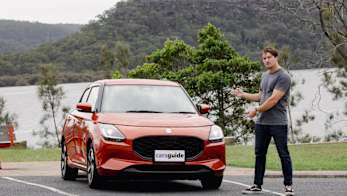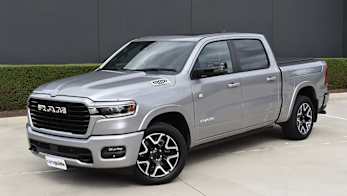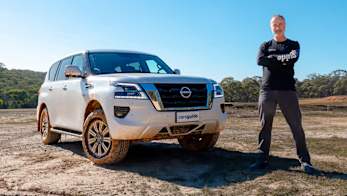Volkswagen said Australia won’t see hybrid versions of the new Tiguan family SUV, despite new efficiency laws taking effect.
One feature that stands out about VW’s new Tiguan range is the complete lack of electrification for any of its engines options. The Toyota RAV4, Australia's best selling passenger car, went hybrid only last year and will usher in a plug-in hybrid alternative with its new generation arriving in 2026.
The third-generation Tiguan arrives on our shores with three engine options in its range, a carryover 1.4-litre turbo 110TSI in front-wheel drive, a new 2.0-litre turbo 150TSI in all-wheel drive and a top-spec 2.0-litre turbo 195TSI in all-wheel drive sourced from the Golf GTI.
All of these engine options benefit from a more refined version of the brand’s seven-speed wet dual-clutch automatic transmission, none are plug-in, plugless or even mild-hybrid systems.
This is despite the fact that more automakers are putting a focus on hybrid engine options as the vice from Australia’s New Vehicle Efficiency Standard (NVES) tightens in the later part of the decade, and the existence of a plug-in hybrid version of this new Tiguan in its German home market (from which all new versions of the mid-sizer are sourced).
Volkswagen’s Director of Passenger Cars, Piergiorgio Minto, explained the PHEV Tiguan was “being worked on” in the background as the brand focused on its core range of mid-sizers in the interim.
“It’s something we think fits perfectly into the market, and we are full throttle working with Germany to test it, to see whether it makes sense, whether as a business case it will work.”
.jpg)
He added Volkswagen’s current positioning on emissions was strong in Australia, and despite the Tiguan launching without hybrid systems. “Everything has quite a good CO2 balance for now,” he said of VW’s current range.
Head of Product Planning for VW Passenger Vehicles, Arjun Nidigallu, added: “The ID.4 and ID.5 take care of that aspect for us - if you want a really efficient powertrain then we have that as an option - in the mean time we’re working away in the background to see if PHEV has a business case.”
The mid-size electric SUVs launched earlier this year, and priced from $59,990 for the ID.4 Pro, are described by the brand as part of a multi-solution approach to the busy mid-size SUV segment, which later this year will be topped-off by the new Tayron seven-seater to replace the Tiguan Allspace.
But as with the significant delays (some of which were self-imposed) impacted the arrival of the ID.4, Volkswagen will be taking a cautious approach to the plug-in hybrid space, framing the timing as an attempt to time the mainstream acceptance of the technology rather than rushing to the market to take advantage of policy settings, like the Fringe Benefits Tax (FBT) exemption, which has seen sales of plug-ins boom.
“The sharp lift in sales [for PHEVs] is coming from a very low base - and that’s an important point because the same thing happened with electric vehicles, it started from a low base, it was a sharp lift and tapered off as it achieved the mainstream.” said Daniel DeGasperi, General Manager of Corporate Communications for VW Australia.
“Our customers have told us, and we’ve done our research, that performance and dynamics are really high [priorities] for those Tiguan customers, and there’s not currently quite a PHEV at that level, if you’re talking about a 150TSI R-Line for $55,000 that achieves that. Certainly, ours will.”
.jpg)
.jpg)


.jpg)
.jpg)
.jpg)
_0.jpg)

.jpg)






.jpg)
.jpg)
.jpg)
.jpg)
.jpg)
.jpg)
.jpg)
.jpg)

.jpg)


